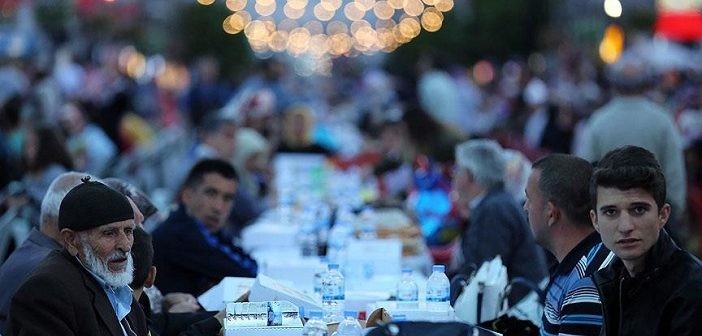
Prayer in Times of Natural Disasters
How do you pray salat al khusuf? How do you perform khusuf prayer? What is earthquake prayer?
Khusuf Prayer
When the moon is eclipsed, it is mandūb for Muslims to perform a two or four-cycle prayer in their homes, one by one, with recitation, like the kusūf prayer, either silently or aloud. This is called the “khusūf prayer”. According to Abu Ḥanīfa, it is not a sunnah to perform this prayer in a congregation in the mosque. However, if it is done, it will be considered permissible. Perhaps since the lunar eclipse may be at night, it is difficult for the congregation to gather in the mosque and perform it in a congregation.[1]
According to Imam Shafiʿi and Aḥmad Ibn Ḥanbal and some hadith scholars, it is performed in congregation. According to Imam Malik, it cannot be performed in congregation.
It is also considered appropriate to perform prayers such as kusūf and khusūf prayers in times of fear such as earthquakes, lightning strikes, strong winds, darkness during the day, fear of light spreading at night, falling stars, continuous rain and snow, epidemics, fear of the enemy and similar fearful times. In this regard, a comparison is made to the kusūf prayer.[2] It is narrated that the Messenger of Allah (saw) invoked as follows when a strong wind blew, “O Allah, indeed, I ask You for its good, the good of what is in it, and the good of what it has been sent with. And I seek refuge in You from its evil, the evil of what is in it, and the evil of what it has been sent with”[3] The value of this invocation of the Messenger of Allah (saw) can be better understood when one thinks about the severe hurricanes, typhoons, and tornadoes that are common in some countries today and cause the death of thousands of people. In the case of such a disaster, there is nothing left to do but seek refuge in Allah. However, it is also necessary to take all kinds of measures and precautions for protection and rescue before and after the storm.
[1] Al-Kāsānī, ibid, I, 282; al-Shurunbulālī, Marāq al-Falaḥ, 92.
[2] See al-Kāsānī, ibid, I, 282; al-Shurunbulālī, ibid, 92; Qudama, Mughnī, II, 429; al-Zaylaī, Naṣbu’r-Raya, II, 234-235.
[3] Al-Tirmidhī, Daʿawāt, 48, 88; Muslim, Istiṣqā, 15.








